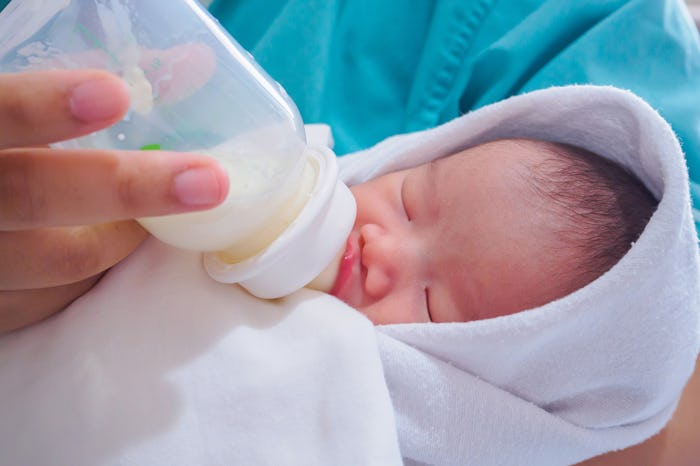Life

Here Are The "Rules" Hospitals Can Enforce When It Comes To Giving Your Baby Formula
As I’m nearing the end of my pregnancy, I was extremely glad to find out my particular hospital is “baby friendly” certified, which means they do everything they can to help you breastfeed your baby successfully, among other things. I’m planning to breastfeed, and I’m nervous and worried about it working out. But knowing that the hospital, my doctor, and staff are on my side helps a lot. They even provide lactation consultants for 12 hours a day. But what if your hospital isn’t considered “baby friendly” and you want to breastfeed? Can the hospital force you to use formula? What would be a circumstance where you didn’t have the choice, if any?
According to Dr. Idries Abdur-Rahman, an OB-GYN and medical travel blogger along with his twin brother for TwinDoctorsTV, a hospital can never force you to use formula against your will. They can only highly recommend and encourage it in certain medically high-risk situations. “The great majority of hospitals are baby-friendly … there are certain medical situations in which a hospital would definitely suggest and encourage the use of formula. The most common reason would be if a baby was having difficulty maintaining his or her blood sugar levels, which occurs with some breastfed babies. In this case, formula helps to increase and stabilize blood sugar levels and can be used in addition to breastfeeding, not instead of,” he explains in an email interview with Romper. “Another less common situation occurs when mom has an infection like HIV that can be transmitted through the breast milk.” However, Abdur-Rahman says that even in these medical situations, the hospital can’t force you to use formula, just highly recommend and encourage.
And if your baby does need to have some formula supplemented at the hospital, as mentioned above, they aren’t doomed to never breastfeed, according to Abdur-Rahman. “Many babies are simultaneously breast and bottle fed, one does not preclude the other. The reason that many bottle-fed babies have difficulty breastfeeding is nipple confusion. There are huge differences between the breast nipple and the bottle nipple, and bottle feeding is much easier [for them] than breastfeeding. Milk flows easily and quickly from the bottle, whereas the baby has to work much harder to get milk from the breast. Simply put, babies that are bottle fed for extended periods of time frequently get lazy and impatient with breastfeeding.” But he notes that your baby won’t necessarily get lazy after getting bottles for a few days. “So all is definitely not lost if your baby was bottle-fed for the first few days of life. It may take them a little more time than usual to get that breastfeeding relationship established, but it definitely can be done.”
The first few days of trying to breastfeed with your baby are crucial, so your baby can get the hang of it for future feedings. “With time however, the baby will get the hang of latching on and you will be able to establish a good breastfeeding relationship. During that transition time, you will want to exclusively breastfeed if at all possible,” he says. If you’re looking for a hospital to suggest formula as an absolutely last resort, you may want to check out a baby-friendly hospital.
Baby-friendly hospitals do a lot to promote optimal bonding and breastfeeding time with your baby. Abdur-Rahman says the hospital he works in is baby-friendly, and his hospital, and other baby-friendly hospitals “attempt to create an environment designed to foster bonding between newborns and their parents. A big part of this is to create a pro-breastfeeding environment. This means that mom is encouraged to put baby to the breast ASAP, usually in the delivery room. Formula is only provided upon maternal request and new mothers have access to a lactation consultant,” he explains. Another perk of a baby-friendly hospital is they promote the “golden hour,” which is the first hour after delivery during which only mom and dad are with the newborn. “Baby-friendly hospitals also encourage rooming in, meaning the baby is in the room with mom and dad 24/7, unless they specifically request that the baby go to the nursery,” he says. This is to promote ultimate bonding time between you and your baby. If you’re looking for a baby-friendly hospital in your area, visit Baby-Friendly USA’s website, where they list hospitals by state.
You don’t have to worry about the hospital “forcing” anything on you that you don’t feel comfortable with; they’ll just highly encourage and recommend things in case of medical emergencies. If they are highly recommending something, have them explain their reasonings and you'll find that they're probably good ones. Their goal is to have you and your baby’s best interests at heart. And if you feel they don’t, voice your concerns.
Check out Romper's new video series, Bearing The Motherload, where disagreeing parents from different sides of an issue sit down with a mediator and talk about how to support (and not judge) each other’s parenting perspectives. New episodes air Mondays on Facebook.